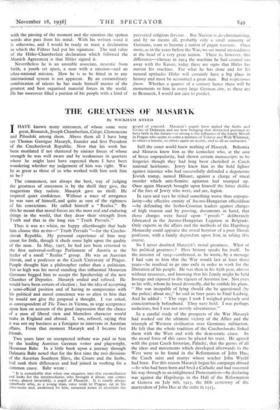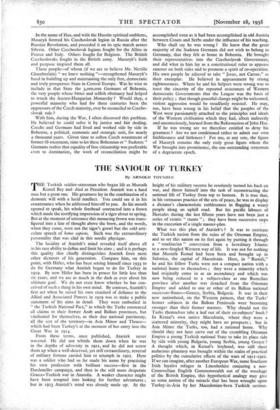THE GREATNESS OF MASARYK
By WICKHAM STEED
T HAVE known many statesmen, of whom some were I great, Bismarck, Joseph Chamberlain, Crispi, Clemenceau and Pilsudski among them. Above them all I have long set Thomas Garrigue Masaryk, founder and first President of the Czechoslovak Republic. Now that his work has been mutilated if not shattered by sinister forces of whose strength he was well aware and by weaknesses in quarters where he might least have expected them I have been wondering whether my judgement of him was right. Was he as great as those of us who worked with him took him to be ?
The commonest, not always the best, way of judging the greatness of statesmen is by the thrill they give, the magnetism they radiate. Masaryk gave no thrill. He inspired quiet confidence. Without a trace of arrogance he was sure of himself, and quite as sure of the rightness of his convictions. He called himself a " Realist." By this he meant that moral forces are the most real and enduring things in the world, that they draw their strength from Truth and that in the long run " Truth Prevails."
Thus it was no whim, no happy afterthought that bade him choose this motto—" Truth Prevails "—for the Czecho- slovak Republic. My personal experience of him may count for little, though it sheds some light upon the quality of the man. In May, 1907, he had just been returned to the first universal-suffrage Parliament of Austria as the leader of a small " Realist " group. He was an Austrian Slovak, and a professor at the Czech University of Prague. People thought him a philosopher rather than a politician. Yet so high was his moral standing that influential Moravian Germans begged him to accept the Speakership of the new Chamber of Deputies. Masaryk smiled and refused. He would have been certain of election ; but the idea of accepting a semi-official position and of having to compromise with his political and moral conscience was so alien to him that he would not give the proposal a thought. I was asked, as correspondent of The Times in Vienna, to urge acceptance upon him on account of the good impression that the choice of a man of liberal view and blameless character would make, in England and abroad. I, too, refused, saying that it was not my business as a foreigner to intervene in Austrian affairs. From that moment Masaryk and I became fast friends.
Two years later an unexpected tribute was paid to him by the leading Austrian German writer and playwright, Hermann Bahr. In a little book upon a journey through Dahnatia Bahr noted that for the first time the two divisions of the Austrian Southern Slays, the Croats and the Serbs, had sunk their differences and had joined in working for a common cause. Bahr wrote : " It is remarkable that when one enquires into this reconciliation and looks for the intermediaries who brought it about, one comes across, almost invariably, a pupil of Masaryk. It is nearly always somebody who, as a young man, once, went to Prague, sat in his class-room and, awakened by him, returned home to proclaim the
gospel of concord. Masaryk's pupils have united the Serbs and Croats of Dalmatia and are now bringing that distracted province to have faith in the future—so strong is the influence of the lonely Slovak in Prague who seems to some a mixture of Tolstoy and Walt Whitman, to others a heretic, to others again an ascetic, and to all an enthusiast."
Still the outer world knew nothing of Masaryk. Bohemia and Moravia knew him as the iconoclast who, at the cost of fierce unpopularity, had shown certain manuscripts to be forgeries though they had long been cherished as Czech national heirlooms. Jewry knew him as the bold fighter against injustice who had successfully defended a degenerate Jewish tramp, named Hilsner, against a charge of ritual murder which anti-Semitic agitation had trumped up. Once again Masaryk brought upon himself the bitter dislike of the foes of Jewry who were, and are, legion.
In 1910 and 1911 he risked something worse than unpopu- larity—the effective enmity of Austro-Hungarian officialdom —by defending the Serbo-Croatian leaders against charges of high treason and by proving, documents in hand, that those charges were based upon " proofs " deliberately fabricated in the Austro-Hungarian Legation at Belgrade. Only experts in the affairs and the methods of the Hapsburg Monarchy could appraise the moral heroism of a poor Slovak professor, with a family dependent upon him, in taking this course.
So I never doubted Masaryk's moral greatness. What of his political greatness ? Here history speaks for itself. In the autumn of 1914—confirmed, as he wrote, by a message I had sent to him that the War would last at least three years—he resolved to go into exile in order to work for the liberation of his people. He was then in his 65th year, almost without resources, and knowing that his family might be held hostage and exposed to the rigours of Austrian law. Not even to his wife, whom he loved devotedly, did he confide his plans. " She was incapable of lying should she be questioned (by the police) about me," he said in later years to Emil Ludwig. And he added : " The steps I took I weighed precisely and conscientiously beforehand. They were bold. I was perhaps audacious, but I was not merely adventurous."
In a careful study of the prospects of the War Masaryk had worked out the ultimate 'victory of the. Allies and the triumph of Western civilisation over Germanic militarism. He felt that the whole tradition of the Czechoslovaks linked them with the West and with the democratic cause. In the moral force of this cause he placed his trust. He agreed with the great Czech historian, Palack3'r, that the germs of all the ideas and movements which developed afterwards in the West were to be found in the Reformation of John Hus, the Czech saint and martyr whose teacher John Wyclif had been. For this reason Masaryk began his campaign abroad —he who had been born and bred a Catholic and had reasoned his way through to an enlightened Protestantism—by declaring war against the Hapsburgs in the Hall of the Reformation at Geneva on July 6th, 1915, the fifth centenary of the martyrdom of John Hus at the stake in 1415. In the name of Hus, and with the Hussite spiritual emblems, Masaryk formed his Czechoslovak legion in Russia after the Russian Revolution, and preceded it on its epic march across Siberia. Other Czechoslovak legions fought for the Allies in France and Italy. Others fought for Belgium. The British Czechoslovaks fought in the British army. Masaryk's faith and purpose inspired them all.
These people—of whom (if we are to believe Mr. Neville Chamberlain) " we know nothing "—strengthened Masaryk's hand in building up and maintaining the only free, democratic and truly prosperous State -in Central Europe. Was he wise to include in that State the 3,000i000 Germans of Bohemia, the very people whose bitter and selfish obstinacy had helped to wreck the Austro-Hungarian Monarchy ? Would they, a powerful minority who had for three centuries been the oppressors of the Czech majority, ever be reconciled to Czecho- slovak rule ?
With him, during the War, I often discussed this problem. He believed he could solve it by justice and fair dealing. Czechs and Germans had lived and worked side by side in Bohemia, a political, economic and strategic unit, for nearly a thousand years. Given time to soften Czech resentment of former ill-treatment, time to let these Bohemian or " Sudeten " Germans realise that equality of free citizenship was preferable even to domination, the work of reconciliation might be accomplished even as it had been accomplished in old Austria between Croats and Serbs under the influence of his teaching.
Who shall say he was wrong ? He knew that the great majority of the Sudeten Germans did not wish to belong to Germany, that they felt at home in Bohemia. He brought their representatives into the Czechoslovak Government, and did what in him lay as a constitutional ruler to appease rancour on both sides and to promote a spirit of co-operation. His own-people he adjured to take " Jesus, not Caesar," as their exemplar. He believed in appeasement by strong righteousness. Where he and his helpers were wrong was to trust the sincerity of the repeated assurances of Western democratic Governments that the League was the basis of their policy ; that though peaceful change might be welcomed, violent aggression would be steadfastly resisted. He may, too, have been wrong in his belief that the peoples of the West were passionately attached to the principles and ideals of the Western civilisation which they had, albeit indirectly and unconsciously, learned from the Reformation of John Hus.
If he was wrong are we therefore entitled to deny his greatness ? Are we not condimned rather to admit our own faithlessness and littleness ? For me, at any rate, the figure of Masaryk remains the only truly great figure. whom the War brought into prominence, the one outstanding statesman of a degenerate epoch.

























































 Previous page
Previous page